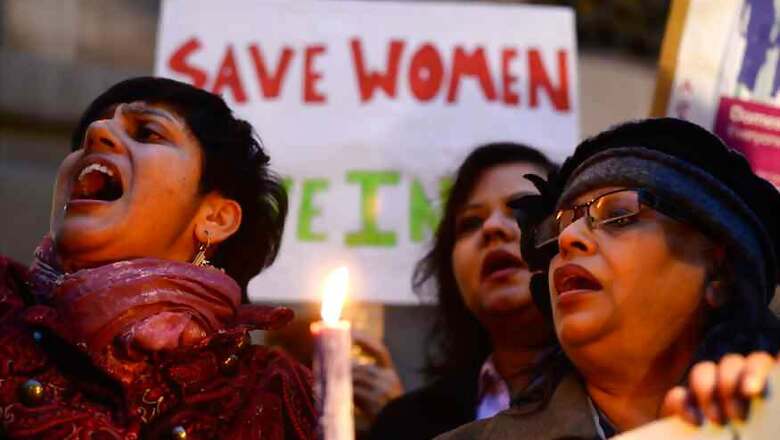
views
New Delhi: Radhabai Gulabrao Umbalkar, 47, was molested, stripped and paraded naked by upper caste men in her village in Buldana tehsil, Maharashtra. Nine months later, the perpetrators are still roaming free.
On June 2, 2017, after an argument with her husband over monthly finances, Radhabai followed him when he left home in a fit of anger. But, he had gone too far.
“I followed to bring him back but he had walked too far and I could not see him. I stopped by the farm to ask a group of people standing there if they had seen my husband. They did not reply initially and then asked me to bring my son and brother-in-law,” said Radhabai, her memories of that day are crystal clear.
The group denied telling her about her husband unless she brought them along.
By the time Radhabai got the two men and went back to the same spot, there were 30 men waiting for them. They immediately started attacking Radhabai and her family members.
Radhabai’s son narrated the incident, the thought of which still scares him. “They identified us as Dalits and started mouthing obscenities. They then pushed me to the ground, started kicking me and my uncle. They hit us with iron rods, wooden sticks and whatever they found,” he said.
Both men suffered serious wounds; her brother-in-law had to undergo 13 stitches on his head. When Radhabai tried to intervene and save her son and her brother-in-law, the men caught her by her arm and pushed her to a corner.
The mob consisting of upper caste men stripped off her clothes and hoisted them as a mark of victory till she was reduced to bare skin.
They then tied her arms and made her walk the entire village, stark naked.
“The men poked twigs and branches in my genitals. A few men brutally tugged at my breasts, scratched my thighs and slapped me multiple times. I was bleeding profusely. There were men recording the entire march as well,” she said firmly, resolute and unmoved perhaps because she has lost all hope of getting justice.
The alleged perpetrators then threw her in a heap of garbage. Radhabai wrapped herself in doormats which other Dalit villagers provided her, and walked straight to the police station.
But like in most cases in the country, the road to justice isn’t easy either. The police officials refused to register an FIR and instead filed a non-cognisable report, a copy of which News18 reviewed. In the case of a non-cognisable offence, the police are not under the liability to investigate the case unless the court directs so.
“None of them have been arrested in the case so far. We visit the police station almost every week but in vain,” said Radhabai’s son.
Sangram Patil, police inspector in-charge of the case, chose to disconnect and never answer calls and text messages after News18’s reporter asked him about the case.
“Nothing is going to happen to them. They will walk free and I will live with this,” Radhabai said.
While the horrific incident of rape and assault on 16 December 2012 in the national capital shook the entire country, multiple Dalit activists and social workers say that the lower caste women in India face multiple ‘Nirbhaya’ like situations, every day.
"When Nirbhaya happened, entire Delhi came on the streets to protest. We see Dalit women raped and abused in a similar fashion almost every other day, with no reaction from anybody at all. You know what is even more saddening? Most women have accepted that this is how it is supposed to be. Those men from upper caste will treat them the way they want and they will have to live with it," said Kaushal Devi, a social worker with Dalit Sthree Sakthi, an NGO.
According to the latest National Crime Record Bureau (NCRB) report, crimes against Dalits in India have risen by 51% over the last 10 years to a total of 40,801 crimes recorded in 2016. Uttar Pradesh accounts for one in every four crimes against Dalits nationwide.
While the world marked ‘Women’s Day’ on March 8, these Dalit families and their tales of injustice were left out of that celebration. The experiences narrated had one thing in common — the will to outrage a woman's modesty did not just end with a heinous act, it continued thereafter in one form or the other.
About 100 kilometres away from Radhabai’s village, in Washim district’s Mothegaon village in Maharashtra, 35-year-old Sangita Powar had gone to finish some bank work.
The house in Mothegaon was owned by her father.
However, Sanjay’s work as a security guard in Karjat made him rent a house there. Sangita moved to the Karjat house with her father Sanjay Powar, a Dalit man, along with her two sons-- one 12 years old and the other 17, after she got separated from her husband.
It was a Tuesday on the seventh day of February last year when the 57-year-old grey-haired man was preparing to doze off in his rented room when he received a call.
“Sangita was alone in the Mothegaon house. I received a call late in the evening from my friends and neighbours there. They were rushing her to the nearest hospital after they heard loud wails from the house. She had severe burns and was unconscious by the time they reached,” said Powar, frustrated and helpless at the same time.
The village hospital was quick to realize that it was not an accident and the woman was brutally raped by multiple men. Sangita was shifted to a hospital in Mumbai the very next day.
“We shifted her to Mumbai where a few of my relatives stay. Police officials registered an FIR based on what onlookers told them and the broken sentences that Sangita could price out,” said Powar.
The 35-year-old was raped and burnt alive. She struggled for a month in the hospital and subsequently passed away.
News18 reviewed copies of the FIR where the complainant alleged Ranjeet, Devidas Deshmukh and 3 others who were involved in the act.
Multiple phone calls and text messages to police inspector, in charge of the case Uttam Kamaji More went unanswered.
“The perpetrators are out on bail. They burnt her after doing what they did. Her sons live with me now. The elder one will start working soon,” said Sanjay, now playing the role of a father to his grandchildren as well.
According to the Census 2011, Uttar Pradesh, Bihar, Andhra Pradesh, Telangana, and Maharashtra cumulatively account for 42% of the Dalit population in the country.
The NCRB report for 2016 states that 25.5% of the total crimes against Dalits were encountered in Uttar Pradesh, home to 20.5% of the total population. The same report revealed that the top most reported crimes involved an assault on women to outrage her modesty and rape.
“It is not just sexual aggression that results in the crimes. They want to impose their caste superiority by pushing them to the wall. The crimes are not generally about just raping or assaulting, it is a long series of crimes that follows,” said Ramesh Nathan, general secretary, National Movement for Dalit Justice, an NGO.
NCRB’s report shows that rape of a Dalit woman is three times more likely than murder of a Dalit and fifteen times more likely than arson (setting fire to a Dalit property).
In order to expedite the prosecution of atrocity cases and improve access to justice for Scheduled Caste and Scheduled Tribes, every state government has been mandated to set up an adequate number of special courts. Cases are to be completed within two months from the filing of the charge sheet.
According to the annual report 2016-17 by the department of social justice and empowerment, Maharashtra has 3 exclusive special courts in a state with 36 districts. Uttar Pradesh, on the other hand, has 40 such courts with 75 districts in the state.
All the eight rape survivors the reporter met said the same thing—there are many others who they know of who have been subjected to similar crimes but chose not to report them.
“There are so many women who decide not to report this due to fear of being socially ridiculed,” said Sushma Kumari, social worker, working for Dalit Sthree Shakti, an NGO.
Kumari said that even after these women gather the courage to complain, police officials refuse to register FIRs and no national media covers them. “We are left with just the option to prepare for another incident,” she said.



















Comments
0 comment